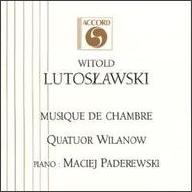Witold Lutoslawski
from Warsaw, Poland
January 25, 1913 - February 7, 1994 (age 81)
Biography
Born in Warsaw, Poland, Lutoslawski's musical talents surfaced early, with his first compositions dating from 1922. He studied piano, violin and composition (with Witold Maliszewski, a pupil of Rimsky-Korsakov), graduating from the Warsaw Conservatory in 1937. His first substantial orchestral work, the Symphonic Variations, was premiered in 1939. Lutoslawski survived the difficult war years and Stalinist period by writing for radio, film and theatre, and doing folk-song arrangements and music for children. Considered too formalist, his concert music was rarely performed. He continued, however, to develop his musical language on his own, culminating in the folk-influenced Concerto for Orchestra (1954). With the cultural thaw of 1955, his reputation began to grow, at home and abroad, as did his compositional style, with twelve-tone harmonies appearing in Funeral Music (1958), and aleatoric rhythmic textures (passages where the musicans are unsynchronized) in Jeux Venitiens (1960). Having achieved his mature style by this point, Lutoslawski went on to compose nearly twenty major orchestral works, including Symphony No. 3 (1982), for which he was awarded the prestigious Grawemayer Award, and his last, Symphony No. 4 (1992), for the Los Angeles Philharmonic. He also composed works for distinguished soloists such as Dietrich Fischer-Dieskau, Heinz Holliger, Anne-Sophie Mutter, Peter Pears, Mstislav Rostropovich and Krystian Zimerman. His extensive experience conducting his own works helped him to refine his musical language, later works becoming more lyrical and harmonically transparent. ~ Jim Harley, Rovi
Top Tracks
Albums
Videos
Close












